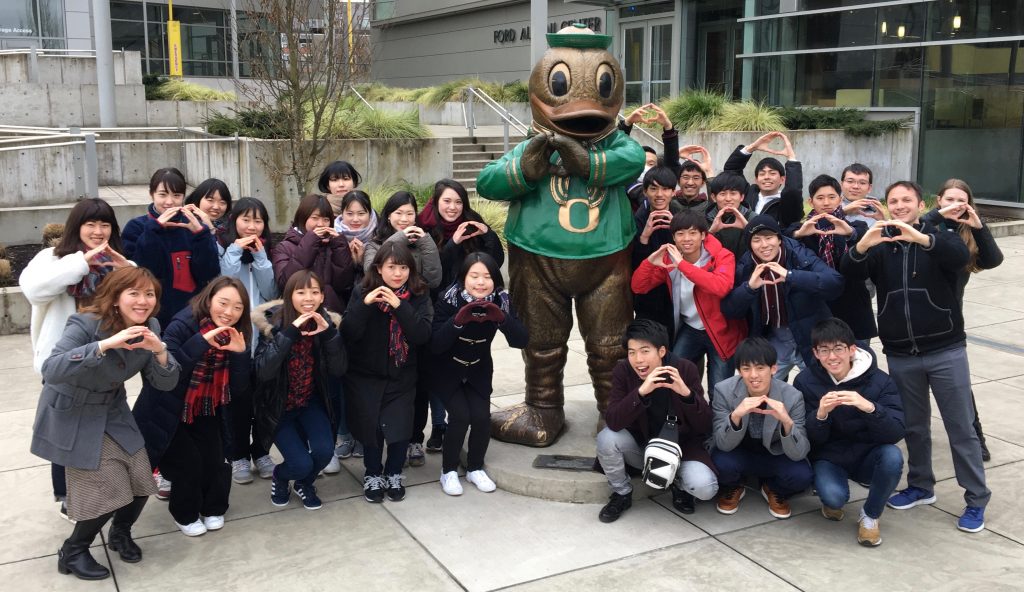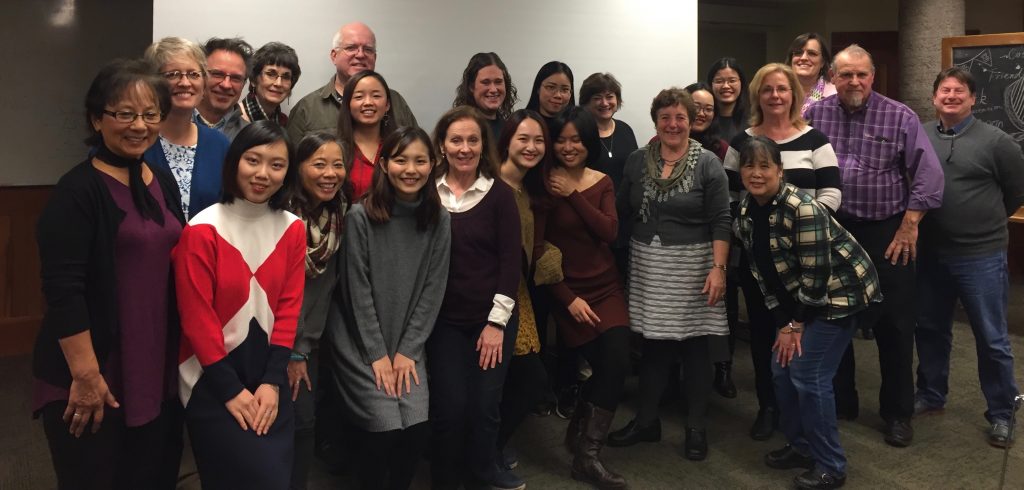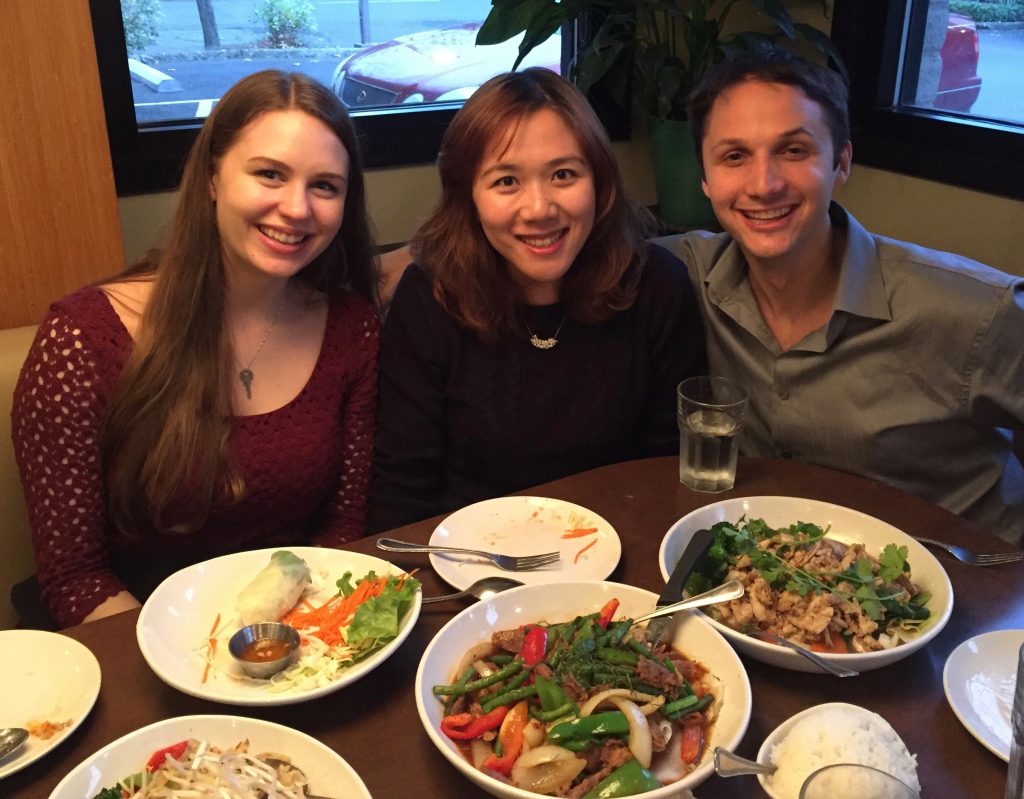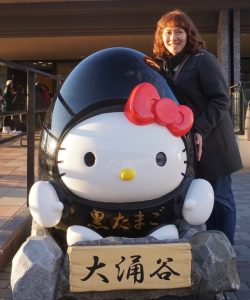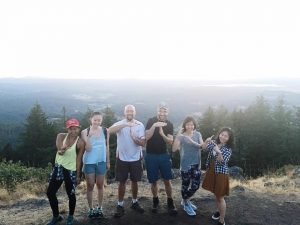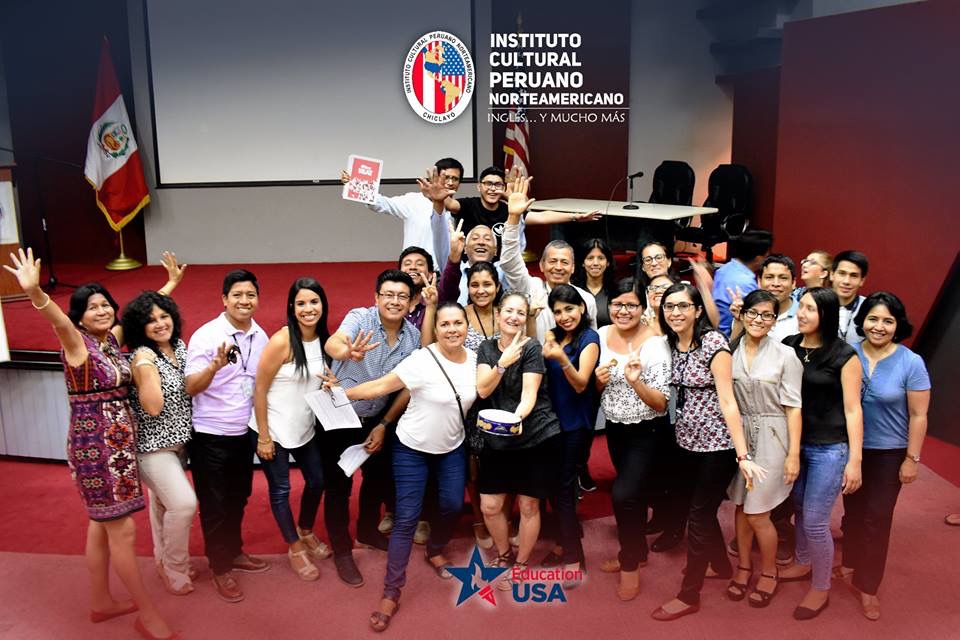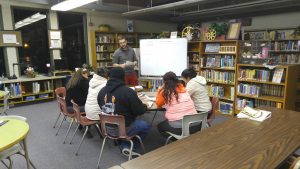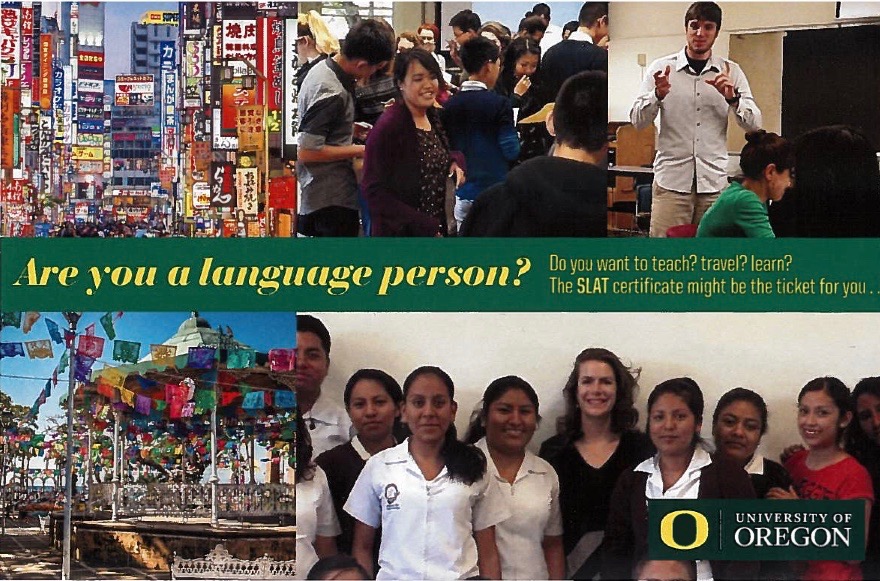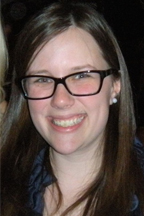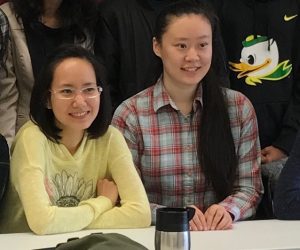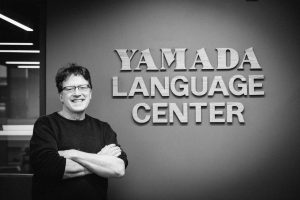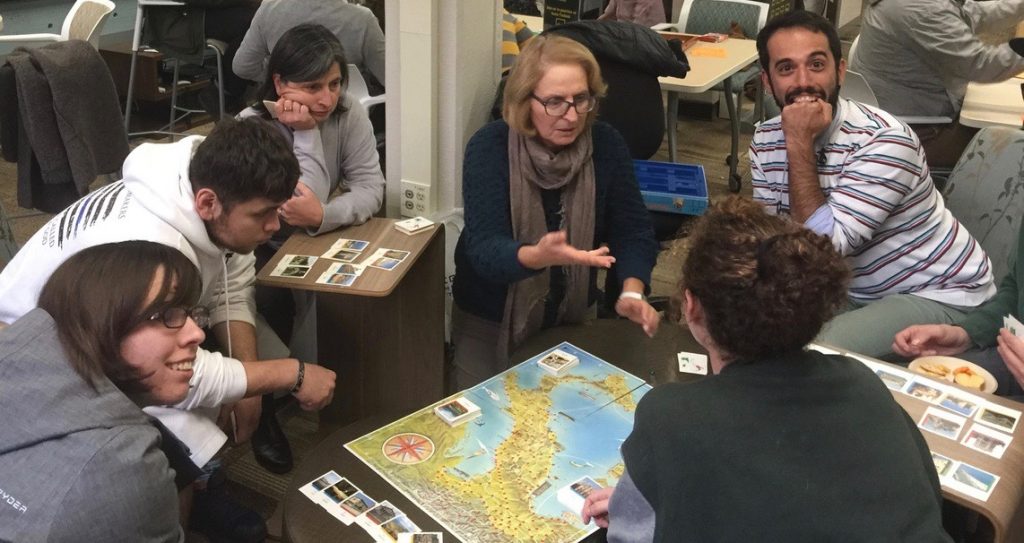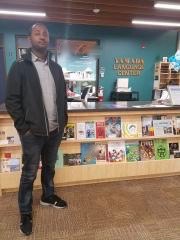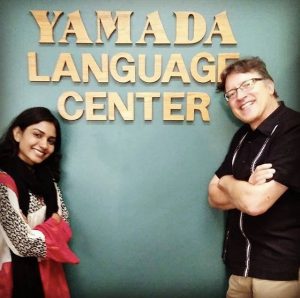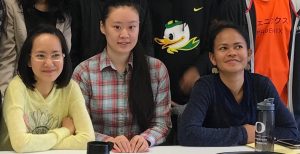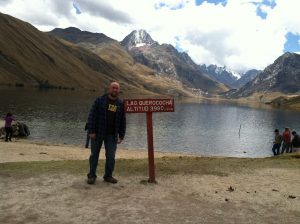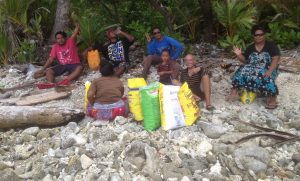Recent LTS graduate Devon Hughes (Fall 2017) spent her final term in the program as the first Fulbright Taiwan FSE Teacher Practicum Program Grantee (based out of Changhua County). We were delighted to find out more about her exciting adventure.

Devon Hughes hiking in the Central Mountains
What were your main activities and responsibilities?
As I was piloting this internship for both LTS and Fulbright Taiwan, I got to determine my own schedule and duties, with the guidance of a local English resource coordinator. I set three primary learning goals from which came my activities and responsibilities.
First, I sought to gain experience teaching in junior high EFL classrooms while encouraging and developing EFL students’ learning motivation and ability. I did this by teaching weekly at three junior high schools in Changhua County. I also observed and presented at various schools around the county.

Devon with student in Changhua County
Second, I wanted to broaden my perspective – as well as that of the local teachers and students – on international issues while gaining insight into the Taiwanese EFL education system at all levels. I worked toward this goal in various ways. I traveled around Changhua County to observe and chat with both Taiwanese and native English-speaking teachers about their classroom experiences, techniques, and views on local and federal education policies. I was an observer and occasional guest lecturer in two undergraduate TESOL courses at the National Changhua University of Education. I also participated in English military service officer meetings at the Changhua International Education and English Teaching Resource Center (CIEETRC) so to learn how military officers with advanced English proficiency and experience living in English-speaking countries support their schools’ English language learning goals. I even attended an international conference with the CIEETRC director on international education for primary and secondary schools.
My third learning goal was to assist in developing English teaching resources and materials and to share English teaching strategies with Changhua County English teachers. I did so by working weekly at CIEETRC on materials development, delivering professional development workshops, and meeting with elementary and junior high school teachers and principals. Together, we worked to increase critical thinking and English use in Changhua County classrooms.
What were some of the highlights of the experience?

Devon with other Fulbright grantees at beach cleaning event
How much time do you have? Haha!
An initial highlight was meeting the other Fulbright grantees at orientation and hearing about their fascinating work. They had come to Taiwan for a variety of reasons and represented a wide range of academic backgrounds. I had the chance to get to know some of these Fulbrighters better at subsequent events like Double Ten Day, Thanksgiving, and a beach cleaning service trip. Each time, I thought, “Whoa. What cool people!”
Speaking of cool people, I got to see some familiar faces while abroad. The night I arrived in Taiwan, I had the great fortune of crossing paths with friend and former AEI colleague Rachel Drummond. She introduced me to another former UO duck, Lydia Shen, and we went out for massages and food at a local night market. Words can’t describe how incredible it was to arrive in a foreign place and immediately connect with a dear friend. A few weeks later, a former AEI student from Taiwan visited me and took me out for lunch and groceries. Such meetings with friends throughout my stay made “halfway around the world” feel like a much smaller distance.

Devon at President Tsai Ing-wen’s Double Ten party
Perhaps the biggest highlight was Double Ten weekend when I got to host my husband, who flew 24 hours each way to spend 96 hours with me. It was wonderful to show him around and to experience Taiwan with him, if only for a few days! I also had the incredible opportunity to attend President Tsai Ing-wen’s Double Ten party along with other Fulbrighters and dignitaries from around the world. I felt like I was in a comedy as I wobbled in my 5-inch heels on the red carpet and told people drinking cocktails, “Oh, I’m here teaching junior high English.”
There were many elements of Taiwanese culture itself that were highlights – the warm and sunny weather, the food (e.g. bubble tea, xiaolongbao, beef noodle soup, fresh tropical fruit), the night markets, and, most especially, the hospitality of the people. Oh, and the scooters! Every time I hitched a ride on the back of a friend’s scooter, I was overcome with awe. As we zipped through crowded streets or up mountain switchbacks, I could only think, “Wow. I am in Taiwan.”

Devon (right) snorkeling in Penghu
Speaking of travel, many highlights were my weekend trips around the island. Solo trips were made easier by Taiwan’s wonderfully efficient public transportation system. I got to explore big cities like Taipei and Kaohsiung, as well as natural sites like Taroko National Park, the central mountains, Penghu (an island archipelago off the west coast) and the southern beaches. One fond memory was snorkeling with a small group of Taiwanese tourists and feeling the language barrier fade away as we squealed and pointed out clown fish and coral.
Okay, one final highlight: I was staying in one night, scrolling through my LINE (social media) contact list when I suddenly realized that around 95% of my contacts were newfound Taiwanese friends. This may sound unremarkable, but to me it was wonderful because I had lived abroad before and had found that ex-pats tended to gravitate toward each other and make insular friend groups. I went to Taiwan hoping for a different experience. A more immersive experience. So, when looking at that contact list of colleagues, university students, and random friends, I felt a wave of gratitude. I had travelled alone to somewhere new, where I didn’t speak the native language, and had managed to make friends! I believe this is largely in part to how generous and warm the Taiwanese people are.
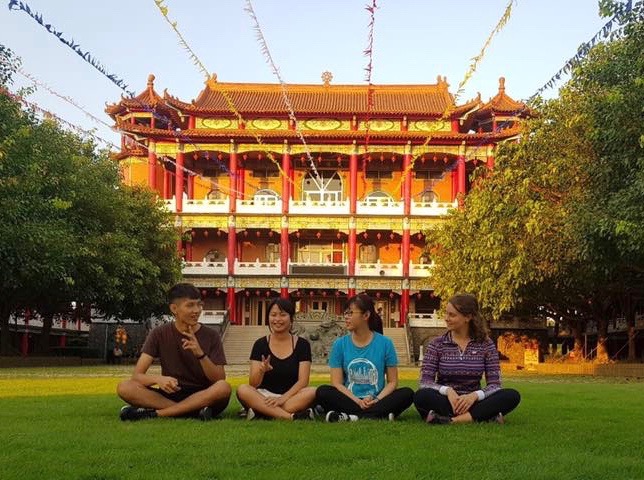
Devon (right) with her Changhua University of Education (NCUE) friends at temple of the Great Buddha statue (大佛寺) in Changhua City
Did you face anything especially surprising or challenging?
Yes, both. Some major challenges in the classroom were a) teaching junior high school students beginner-level English while keeping it interesting and relevant b) working with some students only once due to a quantity over quality approach and c) what my colleagues and I perceived as an overreliance on the L1 (by both teachers and students). I had many conversations with fellow teachers, professors, and the CIEETRC staff about how to best tackle these issues.
My biggest challenge, however, was not in the classroom. Halfway through my stay in Taiwan, I was involved in a head-on car collision during a trip in the mountains with a colleague. Thankfully, neither of us were injured, and I had friends and strangers help me back home to Changhua. Being involved in an accident so far away from loved ones was scary enough, but another, more traumatic car accident years ago made this situation even tougher to process. I found myself faced with the question, “Am I going to make a ____ decision out of fear?” Was I going to cut my internship short and return home? Would I avoid taking car and scooter rides? Would I keep traveling solo? I am so glad I had a support network both at home and in Taiwan to help and encourage me through that time.

Prof Frank (NCUE English dept.), Devon, and Frede (CIEETRC director) beside NCUE in Changhua
As for surprises, I was taken aback by the instant warmth and generosity of the people I met. I received so many thoughtful gifts and invitations. I can never pay them back for their kindness!
Another surprise was the peace that comes from feeling safe (almost) all the time. It’s wonderful. Taiwan is one of the safest places in the world. Experiencing that… travelling without fear (though always with a proper level of precaution), walking down streets without comment, getting lost with little worry… was a breath of fresh air.
A final, funny surprise was how Taiwanese food often reminded me of food from home (North Carolina). Taiwanese mom and pop restaurants serve what Americans call “sweet tea” at most

Devon trying “stinky tofu” at the Changhua Night Market
meals, collard greens cooked in pork fat, and beef stew that rivaled my grandmother’s. It was wild to try a “new” food only to discover that it tastes like home.
How has this experience contributed to your strengths as a language teacher?
My time in Taiwan helped me become more of a self-starter and willing to take risks, both in and out of the classroom. Since it was such an intense experience, I had to be flexible in new, high-stress situations, while remaining mindful of the needs of my students, co-teachers, and stakeholders. It made me a more well-rounded teacher as it provided me the opportunity to work for the first time with junior high students and beginner proficiency levels. I also honed my class observation and teamwork skills through multiple classroom visits and later discussions with colleagues. I also led several professional development workshops, which forced me to stay current and mindful of my own teaching practices. Finally, this experience abroad fostered in me a greater empathy for language learners. Living halfway around the world in a foreign language environment is a very humbling experience!

Devon (front center) with 9th grade students
Is there anything else you’d like to share with us about this experience?
If you get the chance, visit Taiwan! You won’t regret it. Especially if you’re a tea drinker. The best oolong!
What advice would you give an LTS student who is planning to do this internship in the future?
If it makes time and money sense, go for it! Be flexible and ready to say “yes” to any opportunity. What you put into it is what you’ll get out of it (if not more). Yet, also remember to check-in daily with yourself and take care of yourself!
